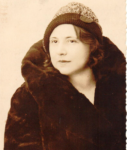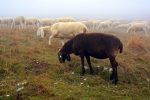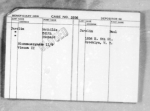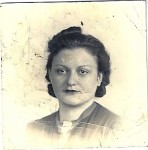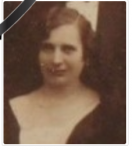Here's another long-time-coming post from my blog archive, this one dating back to July when my cousin Andreas Oberndorfer first discovered this blog and contacted me. I wrote about Andreas's fascinating past, the missing links in his family -- and mine -- in the post Redheads, Resisters, & Red Light Districts, 1: Valerie Oberndorfer-Kornmehl. I have many excuses,
Rolled Beef, Wolf Blitzer & More Buffalo Kornmehls
In my backlog of unfinished posts, this one -- started in November 2019 -- seemed the most timely for this pandemic Passover. It's partly elegiac, which fits the current mood, but it's also about finding new family. And about endurance. A deli-denying newscaster plays a part in the narrative too. Fake news! Rolled Beef, Redux In my dual roles of amateur family
Redheads, Resistors & Red Light Districts, 1: Valerie Oberndorfer-Kornmehl
Freud's Butcher is the gift that keeps on giving. Just when I think I'm about finished with the story of my maternal grandparents' family, another member turns up. This time it is Andreas Oberndorfer, grandson of Valerie Oberndorfer-Kornmehl and nephew of my second cousin once removed, Bruno Oberndorfer-Kornmehl. My newfound Viennese relative appeared out of the blue.
Dayenu: A Kornmehl Reunion in Vienna
Dayenu: It would have been enough. That phrase, repeated as a refrain in a Passover song that offers a litany of thanks for blessings piled upon blessings, has been going through my head sporadically since last October, when I gave a talk at the Freud Museum in Vienna. It's been an amazing journey, albeit one that's taken a rather meandering, bumpy path, from the inception of
The Wedding Photo
It all started on a Facebook group I belong to: A posted photo of a Holocaust victim who had committed suicide rather than be captured by the Nazis led to a larger discussion of the topic. Somehow, I hadn't realized that many Jewish women and men took their lives, either to avoid being taken or to end their suffering at the death camps. I commented that I didn't know
Mystery Adoptions & Cryptic Crypts: Finding Cousin Erika
UPDATE: I was wrong. I hate that -- especially since it means the mystery of Erika remains unresolved. What happened? Sometimes I think that if I wait long enough, relatives will turn up to resolve all my genealogical issues -- or at least clarify them. The original post, below, posited that two childless members of the Kornmehl family, the Schweitzers,
Freud’s World & A London Reunion
There's been a lot going on behind the scenes in the Freud's Butcher universe, but it's like the proverbial tree falling in the forest: If a blogger doesn't post about events, did they really happen? They did, and they will--and here's the proof. Psychology Today I've made many forays into discussions of Freud's life -- in order to provide context for my family's
Martha Solonche (1948-2018), May Her Memory Be a Blessing
This blog has become the occasional home for memorial pages of the recently departed who are not necessarily related to me, as well as the long departed who are. Its Jewish focus makes it particularly apt for the tributes to my friend Martha, who was a rabbi's daughter and went to the Stern College for Women, part of Yeshiva University. As it happens, she is buried at New
Writing Challenge Wrapup: Black Sheep & Single Genealogists
As the 2018 Family History Writing Challenge comes to a close, I observe that I solved a few mysteries; came up with several more; and reaffirmed the importance of genealogists who pass along stories rather than genes. A Divorcee and a Bastard (That's A Technical Term) It seems that my great uncle and aunt, Adolf and Bertha Schweizer -- aka Abraham Rittman and
What’s Freud Got to Do With It? An Earlier Look at My Family History
In this home stretch of the family history writing challenge, I've been thinking about a time when I dipped my toes into the dark sea of my parents' past--and then retreated. The Second Generation Revelation It was the late 1970s. I was working on a doctorate at NYU and seeing a therapist, Mildred,* for anxiety and mild depression. I didn't feel like I was getting a lot out
My Father’s Story: Remembering Paul Jarolim
It's the 23rd day of the Family History Writing Challenge and I see no reason to leave my father out; after all, he's 50% responsible for my genes and 100% responsible for my name. His sister, my aunt Edith Jarolim, was my namesake. More relevant to this challenge: He had almost literally the same history as my mother did in Vienna and New York--down to the closed bank accounts
Commemorating Rita Rosenbaum
George Washington would have been 286 years old today. My mother would have been 105. The robbing of George (and, to be fair, Abe) of his own holiday in the face of the national commerce fest called President's Day happened in 1971 but for the rest of her life, my mother was annoyed that her birthday was no longer a cause for national celebration. So I offer her today
The Sweet in the Bittersweet Schmerling Story
This is Day 20 of the Family History Writing Challenge, wherein I continue the story of the Schmerlings, who returned to Vienna after the war. I realize I've spent more time with other members of my mother's family than I've spent with Adolf and Bertha Schweizer, the ostensible subjects of this challenge, but a bigger picture is beginning to come into focus. I also
From Vienna to Tel Aviv and Back: Reparations Gone Awry
This is Day 19 of The Family History Writing Challenge. I'll pick up where Day 18 left off, with Helene and Siegmund Kornmehl fleeing Vienna to Palestine. The context: I was describing the mystery of the late-life adoption of Erika by the subject of this challenge, Adolf and Bertha Schweizer, and went off on the tangent of the Kornmehl family's other late-life adoption, that
Adoption Musings, Part 2: What Happened to Helene Kornmehl?
On Days 18 of the Family History Writing Challenge, I turn again to a topic that I've touched on before: Nazi record keeping. In "Emigration Questionnaire Raises More Questions," I discussed the agency created to “accelerate the forced emigration of the Austrian Jews and (starting in October 1939) to organize and carry out their deportation." But it wasn't all



